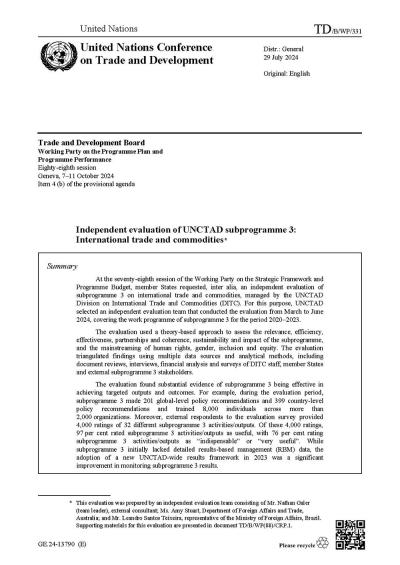
The evaluation of subprogramme 3 (SP3) on international trade and commodities, managed by the UNCTAD Division on International Trade and Commodities, was conducted by an independent team from March to June 2024, and covered subprogramme 3 activities from 2020 to 2023. Detailed results of the evaluation are presented in documents TD/B/WP/331 and TD/B/WP(88)/CRP.1.
The evaluation adopted a theory-based approach to assess the relevance, efficiency, effectiveness, partnerships and coherence, sustainability and impact of subprogramme 3, and the mainstreaming of human rights, gender, inclusion and equity. The evaluation triangulated findings from multiple data sources and analytical methods, including document reviews, interviews, financial analysis, and surveys of staff of the Division on International Trade and Commodities, member States and external subprogramme 3 stakeholders.
Findings indicated that subprogramme 3 was effective in achieving its outputs and outcomes. During the evaluation period, subprogramme 3 made 201 global-level policy recommendations and 399 country-level recommendations and trained 8,000 individuals across more than 2,000 organizations. Survey responses revealed that 97 per cent of the 4,000 ratings for subprogramme 3 activities/outputs were positive, with 76 per cent rating them as "indispensable" or "very useful". Although subprogramme 3 initially lacked detailed results-based management (RBM) data, the adoption of a new UNCTAD-wide results framework in 2023 significantly improved the monitoring of subprogramme 3 results.
Subprogramme 3 demonstrated impact at both the national and international levels. It influenced national decision-makers and policies promoting economic diversification and transformation towards sustainable economies. Subprogramme 3 also made contributions to the multilateral trading system at the World Trade Organization and the broader United Nations system, including the General Assembly. However, challenges in monitoring subprogramme 3 outcomes and ensuring their sustainability persisted due to limited financial resources.
The trade, gender and development programme led efforts to integrate gender equality in trade, and subprogramme 3 initiated actions that considered the rights of persons with disabilities. Numerous stakeholders appreciated that the Division on International Trade and Commodities coordinated the launch of the Inclusive Trade and Persons with Disabilities report. Moreover, the UNCTAD Secretary-General launched an inter-agency working group on disability in trade with the International Labour Organization, International Trade Centre and the World Trade Organization, where subprogramme 3 staff will represent UNCTAD. Despite these efforts, however, gender and other cross-cutting issues were not sufficiently mainstreamed across subprogramme 3 activities.
The Division on International Trade and Commodities exceeded its planned outputs against subprogramme 3 proposed programme budgets and achieved efficiency gains. The evaluation noted that additional efficiencies could be realized through increased collaboration with United Nations regional commissions and country teams. While there was some collaboration between subprogramme 3 and other subprogrammes, there was a desire for the Division on International Trade and Commodities to be more involved in the Trade and Development Report. Overall, due to the lack of disaggregated cost-output-outcome data, the evaluation could not determine the cost-effectiveness of subprogramme 3 resource allocation.
Subprogramme 3 aligns with UNCTAD mandates, including the Nairobi Maafikiano and the Bridgetown Covenant, and the Sustainable Development Goals, and is highly relevant to the needs of member States. Nonetheless, resource constraints limit engagement with the least developed countries in the areas of consensus-building and technical cooperation activities. Stakeholders appreciated efforts of the Division on International Trade and Commodities to link outputs to priority topics, such as critical energy transition minerals. Finally, there was a consensus that subprogramme 3 is at a pivotal moment, with an opportunity to craft a renewed, more focused vision.
Based on these findings, the evaluation recommended that:
- The Division on International Trade and Commodities further embed RBM in subprogramme 3 by developing planning tools with RBM prompts, establishing subprogramme 3-specific indicators and conducting impact assessments.
- The Division on International Trade and Commodities develop a communications strategy, prioritize stakeholders, conduct analyses, engage the least developed countries and consolidate contact lists.
- The Division on International Trade and Commodities develop an operational strategic plan linked to key deliverables (including meetings), covering, inter alia, people management, resource mobilization and partnership building.
- The Division on International Trade and Commodities and UNCTAD should support evolutions to intergovernmental meetings handled by subprogramme 3.
- The Division on International Trade and Commodities rebalance subprogramme 3 resource allocation by recording costs against outputs, linking to outcomes and estimating demands on member State representatives' time.
- The Division on International Trade and Commodities more fully mainstream cross-cutting issues by training staff in gender analysis, involving disability organizations and collecting disaggregated demographic data.


